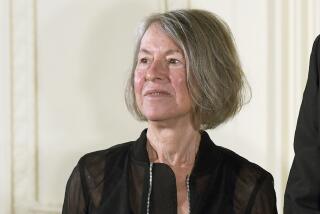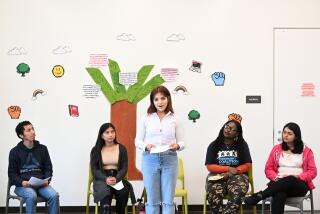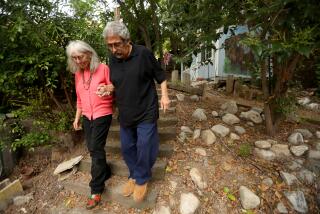The Rest of Her Life May Be an Open Book : 91-Year-Old Reseda Student Learns to Read English at Pierce College
Rose Gralnick is old enough to have gotten married in 1912, old enough to have a 72-year-old son and old enough to remember World War I.
And, if there is one thing she has learned in 91 years, it’s that you’re never too old to learn.
So every Tuesday and Thursday morning about 8:30, a driver picks up Gralnick at the Jewish Home For the Aging in Reseda and takes her to Pierce College in Woodland Hills for a 90-minute class in remedial English.
There, Gralnick joins a dozen or so classmates to whom she could be a great-grandmother, the lone senior in a land of freshmen and sophomores. But to Lee Bernstein, who teaches the course, “Developmental Communications 22,” Gralnick is just another enthusiastic college kid.
‘She’s Progressing’
“She’s a joy,” Bernstein said. “She comes in and works hard, and she’s progressing. She’s happy, we are happy, and it’s wonderful she has the energy to be here at all. We should all be so active at 91. We should all be so active now. “
Gralnick’s life has been full and, at times, difficult. Although she speaks well, she never got the chance to go to school and gain proficiency in reading and writing, a fact that embarrasses her.
“There comes a time when you have to perk up,” said Gralnick, who drove a car until last year and worked part-time until she moved into the Reseda home on March 27. “Now is my time to perk up. I think I’ve waited long enough to go to school, don’t you?”
She was born on April 9, 1894, in a small Russian town near Kiev, the second of seven children. Her mother was Russian, her father an American from St. Louis. An outbreak of typhoid fever killed Rose’s mother in 1905 at age 32.
“Mother nursed us through our bouts with typhoid. But when she got it, she was just too sick and too tired to fight,” Gralnick said.
Father Was Soldier
Her father, who was a soldier in the Russian army, had left Russia to return to America the year before to avoid fighting in the war with Japan, leaving Rose to play mother to her younger siblings.
She couldn’t send a letter to her father because she couldn’t write. “We girls were not allowed to attend school,” she said.
In 1907, Gralnick’s father sent for her and the other children, and they traveled by ship to New York. Five years later, at age 18, Gralnick married. She moved with her husband to San Francisco in 1921, then to Los Angeles in 1938. She was married nearly 36 years when her husband, who had been ill for 11 years, died in 1947.
Then, finding herself practically penniless, Gralnick was forced to do something she had never done before: get a job.
“I had no skills,” she said. “It was, ‘OK, who do I turn to now?’ ”
She said she turned to God “despite the fact I’m not a very religious person.” She didn’t want to burden her two grown children with her problems.
One night, Gralnick phoned the doctor who had cared for her late husband during his illness and asked what she should do. He suggested practical nursing, based on her meticulous care of the man she had loved. She was skeptical, but within two days she had a job helping a Hollywood producer who had just returned home from the hospital. Thus began a career that carried Gralnick through several decades.
‘Never Did Housework’
Her nursing later evolved into what Gralnick calls “companion work.”
“But I never did housework,” she said. “I’ve hated housework all my life, maybe because I had to do so much of it as a child. If they needed cleaning and dusting, I suggested they get a maid.”
She would do some shopping and cooking, but as a paid companion Gralnick essentially served as a friend.
“For this one lady I was with for six years, I’d bring over a sandwich and have lunch with her,” she said. “Then she’d lay down and rest a little bit. When she got up, we’d play tile rummy until I went home in the afternoon.”
Besides being blessed with steady work, Gralnick has also enjoyed nearly perfect health all her life.
“Would you believe me if I told you I’ve never had a headache in my life? There’s been a cold now and then, but never anything to put me back from work or anything,” she said.
Suffers From Insomnia
But Gralnick has consistently suffered from insomnia. Long ago, her doctor prescribed a glass of wine at bedtime to relax the muscles, and it usually did the trick.
Despite having her health, two children, two grandchildren and a pair of great-grandchildren, there was always something missing in Gralnick’s life. Her scholastic shortcomings made her feel ashamed.
“In my younger years I could have gone to school after the children were grown, but I didn’t pay attention to doing anything for Rose,” she said. “I guess it was foolish.”
Since most of Gralnick’s remaining family lives in the San Fernando Valley, she agreed to enter the Reseda home last spring even though she hates to have things done for her. Although she is not officially enrolled, she hopes to fill out the proper forms to certify her attendance at school soon.
“I can already see how tremendously she’s improved since last year, especially in her writing and comprehension,” said her daughter, Eleanor Levin, who lives in Encino. “Her enjoyment of reading is much greater. Now, when she reads love stories or novels, she can really enjoy them and not struggle so much.”
Someone meeting Gralnick for the first time probably wouldn’t guess that she wasn’t a university graduate. She speaks with barely a trace of an accent and uses a sizable vocabulary. She attributes her verbal skills to many hours spent beside radio and television listening to people like Edwin Newman.
“I imitated them,” she said. “They were my long-distance teachers.”
More to Read
Sign up for Essential California
The most important California stories and recommendations in your inbox every morning.
You may occasionally receive promotional content from the Los Angeles Times.










